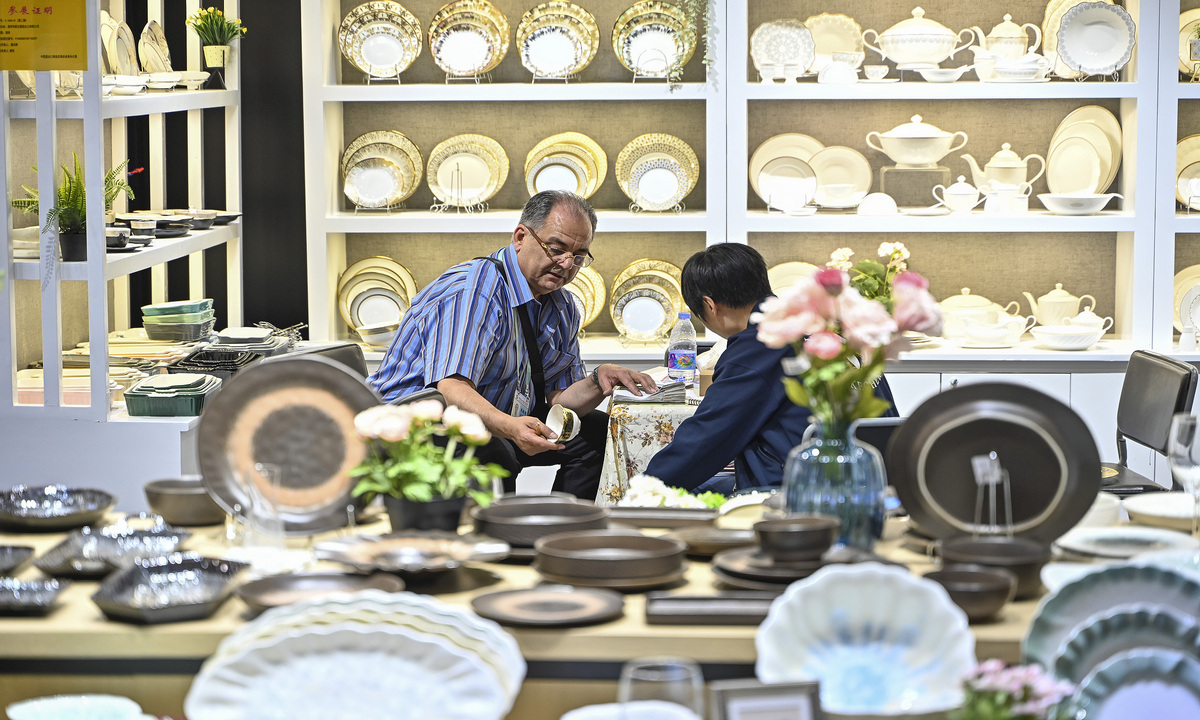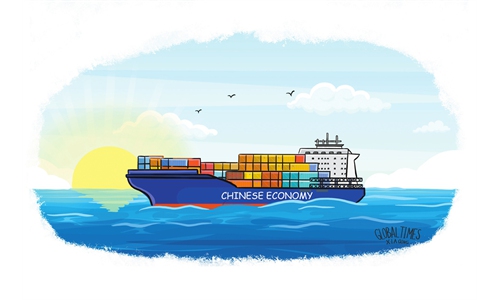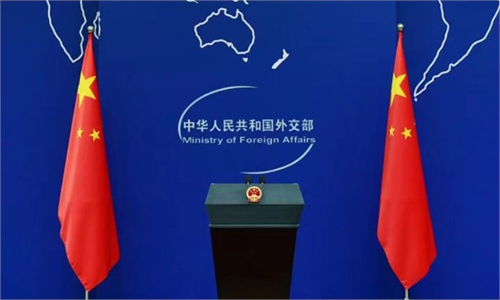Chinese ceramic goods manufacturers receive fresh US orders following trade talks
Swift reactions

Overseas buyers browse products in the daily-use ceramics exhibition area at the 137th China Import and Export Fair in Guangzhou, South China's Guangdong Province, on April 25, 2025. Photo: VCG
The market reactions to the outcome of the China-US trade talks have been swift. After the two sides announced a series of tariff modification measures aimed at easing trade tensions, some Chinese ceramic goods manufacturers said on Monday that they have received fresh orders from US clients."It's encouraging to see that the two countries have announced a series of tariff reduction measures, which have renewed hope for exporters like us," Zheng Pengfei, general manager of Shunmei Group, a leading ceramics exporter in Dehua County, East China's Fujian Province, told the Global Times on Monday.
Some US clients had previously halted orders due to hefty additional tariffs imposed by the US on Chinese products; however, in light of the eased tariff tension between China and the US, Chinese ceramic product manufacturer Shandong Silver Phoenix Co has already begun making production adjustments to prepare for a potential increase in demand from the US, Zhang Bin, director of trade department of the company, told the Global Times on Monday.
China has been a major source of ceramic tableware imports for the US, accounting for 72.06 percent of its total imports in 2023, according to a report released by global trade data provider Tendata in October 2024. While the previously halted orders underscore the disruptions caused by the US tariffs, the new orders following the trade talks highlighted the great expectations of businesses on both sides to continue win-win trade, according to industry participants.
Improved expectations
Following a two-day China-US high-level meeting on economic and trade affairs in Switzerland, China and the US issued a joint statement on Monday, agreeing to remove significant additional tariffs on each other's goods and set up a mechanism to continue discussions about economic and trade relations, according to the Chinese Commerce Ministry.
"Three US clients who previously halted orders due to the US government's tariffs in early April have started to place new orders to our company since Sunday night," Zhang Bin said.
Zheng also said that US clients are expected to resume orders soon, adding that he hopes the US government will further reduce tariffs on Chinese imports.
While the US' previous additional tariffs caused certain impact, multiple Chinese companies said that they are confident that businesses with the US would remain resilient because comparatively high cost-performance Chinese ceramic products are still attractive to US importers.
"American consumers have shown strong user stickiness and rarely switch suppliers. Thus, we expected sustained and substantial orders from the US," Zhang Wanyun, founder of Foshan Muzzi Dector and Tile Co, told the Global Times.
"At the 137th Canton Fair in April, we initially thought it would be difficult to see US businesses. It turned out that there were actually many," Zheng also said, stressing that "business built on sincerity will attract more clients."
"During our communications with our US clients, we found that although many US clients have proposed to temporarily suspend orders, they generally believe such a situation will not last long," Zhang Bin said, adding that "our US clients remain confident in China-US trade."
High-quality devt
In addition to the US market, Chinese ceramic products are also gaining popularity in many other countries and regions, as enterprises said they are pursuing high-quality development through tech innovations and supply chain adjustments.
"We have significantly improved product quality by introducing cutting-edge ceramic printing equipment. Moreover, we have developed low-carbon and eco-friendly products, which can save over 50 percent energy," Zhang Bin said, noting that as a ceramic manufacturer with a history of over 60 years, Silver Phoenix has registered trademarks in over 20 countries, with products exported to the US, the EU, Japan, South Korea, and other markets.
Zheng also said that his company is actively expanding into emerging markets. "We have been active in participating in various domestic and international exhibitions and events, and also established stronger connections with clients from Europe, the Middle East, Southeast Asia, and Belt and Road Initiative (BRI) partner countries to tap into new markets," he said.
The company has also increased investment in research and development to shift toward high-value-added products and improve brand recognition and value chain positioning, according to Zheng.
This is a broader trend in Dehua County. According to local customs data, Dehua County's self-managed exports rose 8.9 percent year-on-year to reach 850 million yuan ($117.6 million) in the first quarter of 2025. "Overall, the rebound in the European market has driven growth in the county's ceramic orders. Thanks to RCEP benefits and logistics improvement, exports to BRI partner countries will likely maintain stable growth, while emerging markets will become key growth drivers," a local official was quoted by local media outlet fjsen.com as saying.
"Opportunities always come along with challenges in the business sector," Zhang Wanyun said. Thanks to Muzzi's product and sales channel advantages, the company is able to retain long-time clients, while attracting new ones, even in entirely different markets, she said.
Muzzi entered other global markets in 2024 by signing a cooperation agreement with Indonesia's leading ceramic manufacturer PT ANGSA DAYA. Under this collaboration, Muzzi contributes technological innovation and design, while integrating its Chinese technical team with the Indonesian factory's workforce to co-develop premium ceramic tiles. These high-end products are now being exported globally, targeting markets in the EU, the US, Australia, and Southeast Asia, according to Zhang Wanyun.
In response to external changes, Chinese companies have demonstrated strong adaptability. This "changing with the times" strategy not only helps buffer short-term external shocks, but also lays a solid foundation for long-term high-quality development, said Ji Wenhua, a professor at the School of Law at the University of International Business and Economics.
"China's economic resilience and potential, especially the new growth drivers unleashed by innovation-driven strategies, provide essential support for addressing international economic and trade frictions," Ji told the Global Times.




